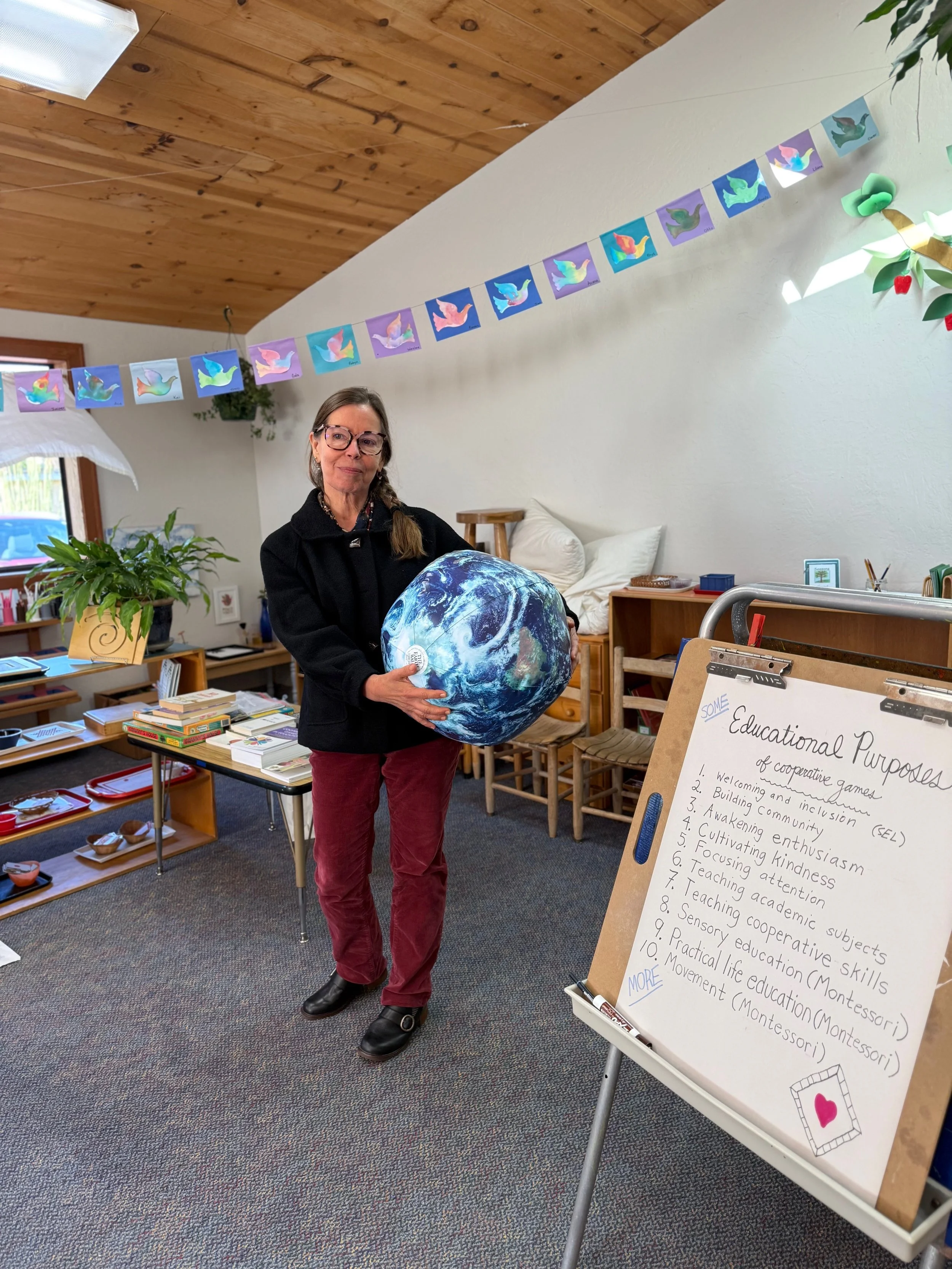Professional Development for Educators
Do you want to create a caring and collaborative classroom climate? Are you looking for play-based methods to teach academic subjects so concepts are accessible to everyone?
We can help!

Hello! Welcome to the Services Page of CooperativeGames.com
This is where you can learn about the webinars, custom workshops, curriculum and program consulting, resource development, and conference presentations we provide. These resources provide a personal and playful training experience or an educational resource tailored to meet your needs. All services are delivered by Suzanne Lyons, founder of CooperativeGames.com.
There are plenty of educators who have not yet heard about cooperative games. They are missing out! Great cooperative games exist for all ages and settings, they serve diverse educational aims, and they are rich in benefits!
You can work magic with cooperative games using the services we provide.
Get to know how and why to use cooperative games in your educational program! Click here to get in touch or call 1-800-328-1050
Thank You for your interest in fostering peaceful, productive cooperative play.
Webinars
Bring staff together for an engaging online session. We will show how to use cooperative games to enhance cooperative skills and motivation, engagement, social-emotional learning, and academic achievement.
-
Each webinar is a live, interactive online session led personally by Suzanne. Sessions typically run 60–90 minutes and can be customized for your staff’s needs or schedule.
-
Cooperative Games in Education from Preschool through College: Background and Overview
Cooperative Games in Early Childhood Programs
Cooperative Games for Montessori Education
Using Cooperative Games for Social-Emotional Learning
Cooperative Games to Prevent Bullying
Cooperative Games for Peace and Justice Studies
Using Cooperative Games to Teach Math
Cooperative Games as a Tool for Building Democratic Skills
Cooperative Games for Environmental Education
Cooperative Games for STEM Learning
-
Certificate of Completion for Professional Development sessions
Session handouts
Follow-up support options
W-9, contract, and invoicing for easy admin processing
Live Workshops
For many of us, there is no better way to learn about cooperative play than to play the games ourselves and reflect on our experience with a knowledgeable expert. Because there are very few true experts on cooperative play in the world today, and Suzanne is one of them, arranging a workshop through our small company provides a rare opportunity.
-
Workshops always consist of fun and engaging cooperative games plus rich, pedagogical discussion. Workshops can be as brief as two hours or last as long as several days.
Workshops are designed to give educators the skills they need to facilitate cooperative games. Such skills include:
knowing how to choose or design good games targeted to educational aims
knowing how to give directions to keep play fun, safe, age-appropriate, and educational
understanding how to debrief the games so students can take away lessons to apply at school and beyond
-
There is a wide choice of workshop themes for you to choose from. These include: a general overview of cooperative games in education; cooperative games in early childhood education or Montessori education; cooperative games for bullying prevention or SEL; cooperative games for teaching math, STEM, or environmental education; cooperative games for cultivating democratic skills; and cooperative games for peace and justice studies.
If you need a custom workshop for another educational topic, we can work with you on that too. Let’s explore your project.
Live workshops are a great way for schools to make lasting change quickly, easily, and inexpensively and to serve students of diverse ages, abilities, and backgrounds. All of this—and they’re fun too!
-
Certificate of Completion for Professional Development sessions
Session handouts
Follow-up support options
W-9, contract, and invoicing for easy admin processing
Consulting
Do you have a curriculum or educational program you’d like to enhance with cooperative play-based strategies? We work with program leaders to develop curricula for students of all ages. We also work with educational publishers, game designers, and organizations that want to use cooperative games for building collaboration in the workplace.
-
Consulting engagements begin with a discovery meeting to clarify your program goals and audience. From there, Suzanne reviews your current materials or plans and collaborates with your team to design curricula, lesson plans, or program structures that weave in cooperative play strategies. Grant-writing assistance is available as well. Educational publishers can hire Suzanne to create educational materials of all sorts from books, to games, to ancillary products including teaching manuals and workbooks and illustrated hand-outs.
-
Certificate of Completion for Professional Development sessions
Session handouts
Follow-up support options
W-9, contract, and invoicing for easy admin processing
Speaking & Conference
Presentations
Are you organizing a conference, institute, or festival? Cooperative games presentations bring communities together and liven up group gatherings! Suzanne’s presentations are always interactive, energizing, thought-provoking and fun. Let us know what your professional event is all about. Cooperative games are versatile. It’s likely we can find a fit!
-
Presentations are tailored to fit your event format and setting, whether it’s a keynote, conference presentation, or festival. Attendees will experience cooperative play firsthand through lively games and and group reflection. Sessions can range from 30 minutes to 90 minutes, with options for extended workshops.
-
Popular presentation topics include: a general overview of cooperative games in education; cooperative games in early childhood education or Montessori education; cooperative games for bullying prevention or SEL; cooperative games for teaching math, STEM, or environmental education; cooperative games for cultivating democratic skills; and cooperative games for peace and justice studies.
If you are interested in another topic, we can work with you on that too. Let’s explore your project. Cooperative games are versatile.
-
Discounts on our books, posters, and downloadable games
Follow-up support options
W-9, contract, and invoicing for easy admin processing





